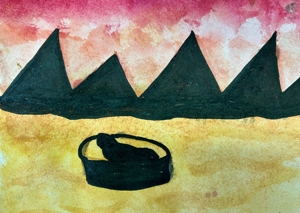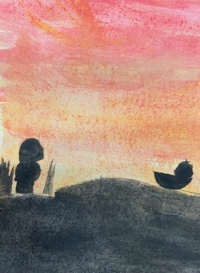Religious Education

Curriculum Statement for the teaching and learning of Religious Education.
Intent
At Church Walk C.E. Primary School, RE expresses and strengthens our vision, ethos and values that are at the heart of what we aim to do in every aspect of school life that offers human flourishing for all. The importance placed on the development of the whole child spiritually, morally, socially, culturally and intellectually is reflected in the RE curriculum.
In Church Walk C. E. Primary School where pupils and staff come from different faiths and none, RE is a highly valued academic subject that enables understanding of how religion and beliefs affect our lives. There is ‘a commitment to generous hospitality, being true to our underpinning faith, but with a deep respect for the integrity of other religious traditions (and worldviews) and for the religious freedom of each person. (Statement of Entitlement 2019)
The school provides an RE curriculum that is rich and varied and studies a range of world religions and worldviews. At the heart of RE in this school is the teaching of Christianity, rooted in the person and work of Jesus Christ that enables learners to acquire a thorough knowledge and understanding of the Christian faith.
Our aim is to provide a wide range of opportunities for learners to understand and to make links between the beliefs, practices and value systems of the range of faiths studied. Links with the Christian vision and values of the school are intrinsic to our RE curriculum.
The aims of religious education in this school are:
- To enable pupils to know about and understand Christianity as a diverse global living faith through the exploration of core beliefs using an approach that critically engages with biblical text.
- To enable pupils to gain knowledge and understanding of a range of religions and worldviews appreciating diversity, continuity and change within the religions and worldviews being studied.
- To facilitate pupils to engage with challenging questions of meaning and purpose raised by human existence and experience.
- To enable pupils to recognise the concept of religion and its continuing influence on Britain’s cultural heritage and in the lives of individuals and societies in different times, cultures and places.
- To encourage pupils to explore their own religious, spiritual and philosophical ways living, believing and thinking.
National Society RE Statement of Entitlement 2019
As a voluntary aided school, we are required by law to provide RE in accordance with our trust deed.
Parents have a legal right in accordance with the Education act 1996 to withdraw their children from RE lessons. As this subject is central to the life and identity of Church Walk Church of England Primary School, we ask parents to discuss with the head teacher any reasons they might have for doing this.
Implementation
Pupils are encouraged to know about, understand and respond to the ultimate questions of life and ethical issues. Our curriculum inspires pupils to explore, develop and affirm their own faith and values whilst having respect for the faith, beliefs and values of others. We are committed to education for wisdom, hope, community and dignity.
Encountering religion and belief includes:
- Enquiry into and investigation of the nature of religion
- Key beliefs and teachings, practices,
- Impact on the lives of believers and communities,
- Different ways of expressing beliefs, teachings and practices
- Developing pupil skills of interpretation, analysis and explanation in relation to religion
- Pupils’ communication of their knowledge and understanding using specialist vocabulary.
- Pupils reflection on and response to their own experiences, questions of identity and belonging, meaning purpose and truth, values and commitment
- Development of religious literacy
- We follow the Questful R.E. units of work and Understanding Christianity.
- There are clear learning outcomes for all units of work, based on the appropriate expectations as set out in the RE syllabus. Most units start with a thoughtful question, which enables the children to reflect upon what they already know and make links to other units of work.
- RE has at least 5% of curriculum time i.e. 50 minutes per week in the foundation stage and key stage 1 increasing to 1 hour per week in key stage 2.
- Long term plans for RE ensure that there is continuity and progression for all pupils.
- Pupil progress and attainment in RE is tracked and recorded after every unit. Progress in RE is included in each child’s annual report to parents.
- Inclusion and differentiation for children with SEND are an integral part of RE planning and teaching
- RE is taught as a discreet subject but may also have cross curricular links, particularly in Reception and Key Stage 1.
- A range of visitors support the teaching of RE, and whenever possible, there will be planned visits to places of worship
- In this school the faiths taught in RE are:
- KS1 are Christianity and Judaism
- KS2 Christianity, Judaism and Buddhism
- Other religions and worldviews may be taught implicitly or when comparing ideas or as thematic studies. For instance, the Muslim Hajj as part of work on pilgrimage or Muslim prayer as part of a unit looking at different aspects of prayer. Diwali is taught as part of a topic about light in Reception. Year 5 and 6 look at Islam when studying the Middle East.
- Of the RE taught, 70% focusses on Christianity and 30% focusses on other faiths.
- Wherever possible, links are made between Religious Education and other curriculum subjects such as Art, History and Geography, Design Technology and PSHE
SMSC
- Religious Education is a key opportunity for children to develop morally, spiritually, socially and culturally. We invite children to reflect on their personal responses to issues, consider those of others, and appreciate that for some people belief in a spiritual dimension is important.
- We encourage children to consider the answers offered by faith groups to questions of meaning and purpose and problems within society as well as their own experiences
- Religious education also strongly supports the school’s citizenship programme by introducing pupils to the significance of belonging to a community, the diversity of communities in the wider community, faith rules and their application to moral and ethical issues and cultural influences on religious practice. This includes work on British values (democracy, the rule of law, individual liberty, respect and tolerance).
Sharing Work
Each class has a scrap book which is used to record aspects of discussion or group work. Photographs are taken and included in the scrap book.All children have an RE exercise book to record written tasks. The book usually covers more than one year so children can see the progress that they make through school. Other activities may be reflective and children may use questioning and comments rather than recording. In Reception and Key stage 1, staff may scribe the children’s thoughts. There are also opportunities for children to work collaboratively and produce mind maps about certain concepts. Drama plays an important part in the teaching of RE and children are encouraged to participate in re- enacting of key events or stories. Year 1 and 2 explore The Last Supper as part of the unit on how Christians celebrate Easter. Godly Play style and stilling activities are also used in different year groups. Year 5 and 6 use art work to explore The Prince of Peace. They use a Philosophy for Children approach when talking about incarnation.
Local Context
Church Walk works closely with Ulverston Parish Church; the clergy visit regularly and members of the congregation are invited into school to contribute to aspects of RE lessons. Children also visit the Parish Church as a religious building in most year groups. Year 1 and 2 explore why it is a special place for Christians.
Other activities such as Experience Easter or Experience Pentecost are run in conjunction with members of the Parish Church and other denominations in Ulverston. Children enjoy these events and are given time to reflect and learn in an experiential way.
On Ascension Day, the whole school walks up Hoad Hill to remember the events. Parents join us for this.
Impact
- Give a theologically informed and thoughtful account of Christianity as a living and diverse faith.
- Show an informed and respectful attitude to religions and worldviews in their search for God and meaning.
- Reflect critically and responsibly on their own spiritual, philosophical and ethical convictions
- Engage in meaningful and informed dialogue with those of other faiths and none.
National Society RE Statement of Entitlement
Pupil Voice
Children tell us that they enjoy RE and it helps them to understand the beliefs of people around the world.
Evidence in Knowledge and skills.
Children will be informed and equipped with knowledge and understanding of a range of religions and worldviews, enabling them to develop their ideas, values and identities. They will be insightful, linking personal reflections with aspects studied; having an open and enquiring mind and being reflective about the ultimate questions of life. They will be able to articulate their personal beliefs, ideas, values and experiences while respecting the right of others to differ.
Concepts of RE are explored across many curriculum areas and within broader school life: learning traits, school policies, school rules, class charters harvest festivals and other celebrations in the Church calendar such as concerts and community events.
Visits and visitors create further opportunities to enrich understanding as do themed days such as charity events.
R.E. Policy
Questful R.E. Scheme of Work
Newlands Class used this painting of Jesus to explore light in Christianity

Year 2 have been looking at Joseph as a Bible hero.



Springfield Class have been using art to depict the story of Moses.
Hoad Class went to the Parish Church to learn about why it is a special building.


Crosses from Year 2 showing important parts of their lives. Birkrigg learned about different ways of belonging.
Easter Poem by Benjamin Year 5
Easter is a time to think,
Not forgetting the bread and drink,
But that is only the start,
Let's go through the Christian part.
He had a last supper and went to Golgotha to pray,
Then got arrested at the break of day,
He confessed and the crowd shouted CRUCIFY,
Then got hung on a cross left to die.
Easter is a holiday treat,
Where a bunny leaves some sweets,
But he has hidden them away,
For you to find on Easter Day.
Even though they are both true,
Which belief is for you?
Did you want a bunny to call?
Or a hero that SAVED us all?
Newlands thought about guiding lights in their lives
Springfield made an Easter Garden.

Springfield Class made powerpoints about different religions.
Churches Together in Ulverston visited school and retold the Easter Story
‘Teach children how they should live and they will remember it all of their lives.’ Proverbs 22:6
Our Vision
Our vision is to provide a secure, happy learning community based upon Christian Values in which each child is encouraged to reach their full potential.
We aim to support the children's developing skills as learners by:
- Providing a secure foundation upon which individuals can grow into independent, challenged learners.
- Stimulating active learning experiences,that develop children's awareness of themselves as learners.
- Valuing every child irrespectve of gender, disability,age, race or culture and ensure that they have an active voice in school and know that their opinions matter.
- Supporting children in succeeding in their learning and finding opportunities to celebrate their success.
- Developing skills of independence, co-operation and self- motivation.
- Contributing to the wider community, both locally and globally.
Download the Church Walk App

